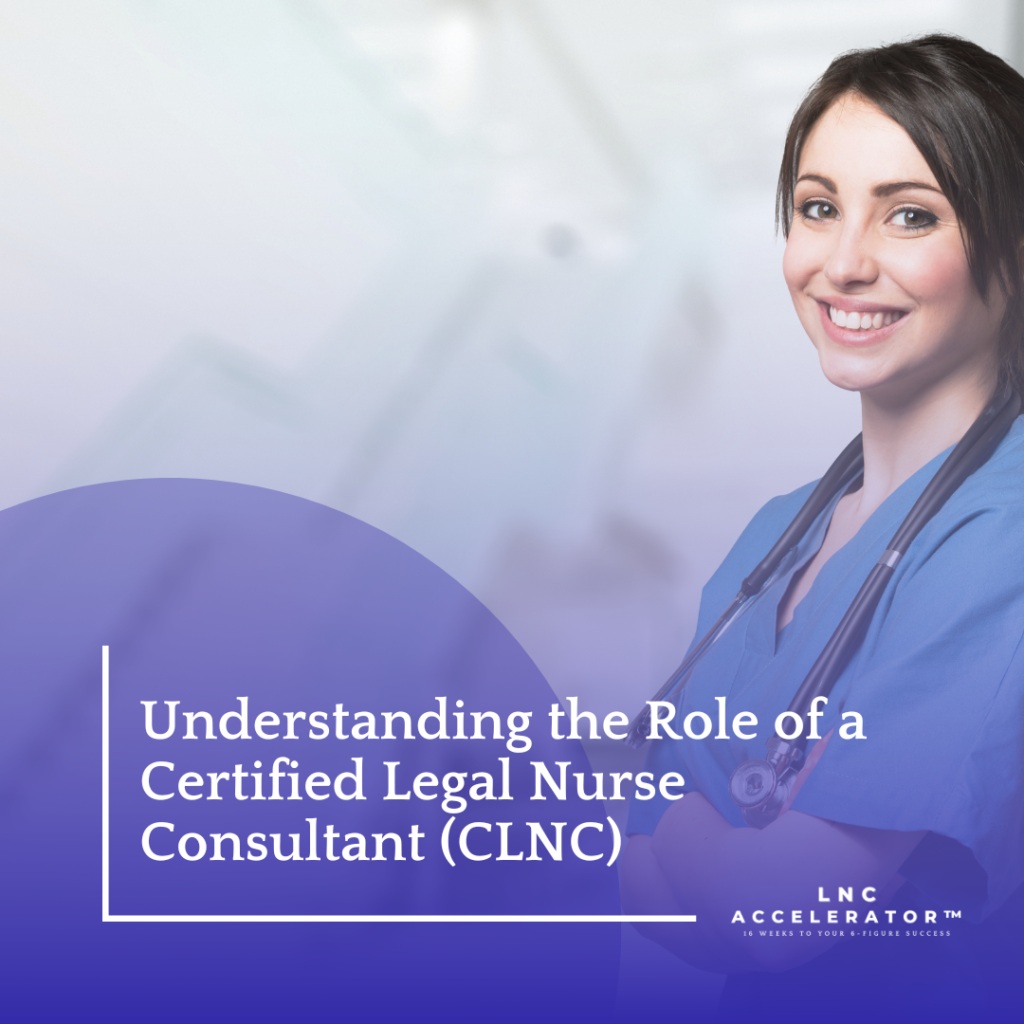
Understanding the Role of a Certified Legal Nurse Consultant (CLNC)
The healthcare and legal fields often intersect, creating a need for professionals who can bridge the gap between these two complex worlds. This is where Legal Nurse Consultants (LNCs) come in, playing a crucial role in medical-related legal cases. In this blog post, we’ll explore the role of a Certified Legal Nurse Consultant (CLNC), debunk some common misconceptions, and provide insights into this exciting career path.
What is a Legal Nurse Consultant?
A Legal Nurse Consultant is a registered nurse who uses their healthcare knowledge and experience to consult on medical-related legal cases. LNCs work with attorneys, insurance companies, and other legal professionals, providing expert analysis of healthcare issues in legal matters. Legal Nurse Consulting Expert vs. Testifying Expert
The Myth of Certification
Before we delve deeper, it’s crucial to address a common misconception. Many believe that to become an LNC, you need a specific “Certified Legal Nurse Consultant” (CLNC) certification. However, as Stephaney Edwards, CEO of the LNC Accelerator™, emphasizes, this is not the case. Your nursing license and clinical experience are your primary qualifications for becoming an LNC. Additional certifications, while available, are not necessary to practice and succeed in this field.
Key Responsibilities of a Legal Nurse Consultant
Whether certified or not, LNCs perform a variety of important tasks:
- Medical Record Analysis: LNCs review and interpret medical records, identifying key issues relevant to the legal case. 5 Steps to Becoming a Successful Legal Nurse Consultant
- Standards of Care Evaluation: They assess whether the healthcare provided met the accepted standards of care.
- Medical Literature Research: LNCs conduct research to support case arguments or understand current medical practices. From Novice to Expert: Growth Strategies for New Legal Nurse Consultants
- Expert Witness Identification: They help attorneys find and vet appropriate medical expert witnesses.
- Case Merit Assessment: LNCs evaluate the strengths and weaknesses of medical-related cases. Understanding the Role of a Certified Legal Nurse Consultant (CLNC)
- Medical Terminology Translation: They explain complex medical concepts to attorneys and other legal professionals.
- Chronology Development: LNCs create timelines of medical events relevant to the case.
- Report Writing: They prepare detailed, objective reports summarizing their findings.
Legal Nurse Consultant Salary and Job Opportunities
The earning potential for LNCs can be significant. While salaries vary based on experience, location, and whether you work independently or for an organization, many LNCs earn more than they did in traditional nursing roles. According to the LNC Accelerator™ program, successful LNCs can earn six-figure incomes.
Job opportunities for LNCs are diverse. They may work in:
- Law firms
- Insurance companies
- Government agencies
- Healthcare facilities
- Independent consulting practices
The Transition from Traditional Nursing to Legal Nurse Consulting
Transitioning from bedside nursing to legal nurse consulting can be an exciting career move. It allows nurses to leverage their clinical experience in a new context, often with more flexibility and potentially higher earnings.
To make this transition, nurses typically need:
- A current RN license
- At least 3-5 years of clinical experience
- Strong analytical and communication skills
- Basic understanding of legal concepts (which can be learned on the job or through programs like the LNC Accelerator™)
While some choose to pursue legal nurse consultant certification, it’s important to reiterate that this is not a requirement. Many successful LNCs build thriving careers without additional certifications. Why You Don’t Need a Certification to Be a Successful Legal Nurse Consultant
The LNC Accelerator™ Approach
Instead of focusing on certification, programs like the LNC Accelerator™ offer a more practical approach to launching an LNC career. They provide:
- Business skills training
- Marketing strategies to win clients
- Hands-on experience with real cases
- Mentorship from successful LNCs
- Access to tools like the LNC Blueprint for efficient business management
These programs focus on developing the practical skills needed to succeed as an LNC, rather than preparing for a certification exam. The LNC Blueprint: A Roadmap to Success in Legal Nurse Consulting
Skills Needed for Success as an LNC
Whether certified or not, successful LNCs possess:
- Strong clinical knowledge
- Excellent analytical skills
- Clear communication abilities (both written and verbal)
- Attention to detail
- Objectivity and ethical integrity
- Time management skills
- Basic legal knowledge (which can be developed over time) Essential Skills Every Successful Legal Nurse Consultant Needs
The Importance of Continuing Education
While formal certification may not be necessary, continuing education is crucial for LNCs. The medical and legal fields are constantly evolving, and successful LNCs stay updated on:
- Advances in medical treatments and technologies
- Changes in healthcare regulations
- Developments in medical-related law
- New standards of care in various medical specialties
This ongoing learning can be achieved through:
- Reading medical and legal journals
- Attending conferences and webinars
- Participating in professional associations
- Engaging with programs like the LNC Accelerator™ for continued support and education
Conclusion
The role of a Legal Nurse Consultant offers a unique and rewarding career path for nurses looking to leverage their clinical experience in a new way. While certifications like CLNC exist, they are not a requirement for success in this field. Your nursing license, clinical experience, and willingness to learn are the true foundations for a successful LNC career.
If you’re considering this exciting career transition, remember that programs like the LNC Accelerator™ can provide valuable guidance, focusing on practical skills and business development rather than unnecessary certifications. With the right approach and dedication, you can build a thriving career as a Legal Nurse Consultant, making a significant impact at the intersection of healthcare and law.
Whether you choose to pursue certification or not, the key to success lies in effectively applying your nursing knowledge to legal cases, continuously expanding your skills, and building strong relationships within the legal community. As an LNC, you have the opportunity to make a meaningful difference in the legal process, ensuring that medical facts are accurately represented and understood in legal proceedings. How to Market Yourself as a Legal Nurse Consultant and Win Clients
FREE DOWNLOAD
10 LNC Business Essentials
Become a Legal Nurse Consultant
6 Figure Income Projection + Cases & Clients in 16 Weeks or Less...
(Or We’ll Work With You 1-On-1 For Free Until You Do)


